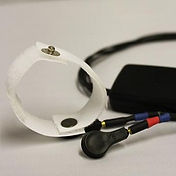&You
A physical aid for Cognitive Behavioral Therapy


Cognitive Behavioral Therapy
CBT trains patients to rethink emotions and deliberately change attitudes.
Mindfulness:
Patients practicing CBT first learn mindfulness, which helps them to constantly monitor their state of mind.
Recognition:
When a stressful stimulus triggers an anxious reaction, mindfulness helps the user to recognize the reaction and what is causing it.
Dismissal:
Through the act of recognizing the anxious reaction as unreasonable or irrational, the patient is able to dismiss it and move on with their day.
Cognitive Behavioral Therapy is designed to treat Anxiety and Depression by changing the way one thinks, feels, and behaves in response to stressful stimuli. CBT is also the most statistically effective treatment and has absolutely no negative side effects.

The biggest difficulty in achieving success through CBT is training yourself to do it consistently.
A wearable device which constantly monitors for spikes in anxiety, and creates a parallel between the mental actions of CBT and a relaxing physical action could be a valuable tool in everyday CBT training.
Concept: creating a physical parallel
Detecting Anxiety
Two measurable symptoms of anxiety are spikes in heart rate and perspiration.

Pulse Sensor
Senses pulse to determine heart rate (BPM).

Galvanic Skin Response Sensor
Senses changes in skin conductivity caused by perspiration.
Using 2 externally detectable symptoms of anxiety ensures fewer false positives. One may have a spike in perspiration caused by temperature, or a rise in heart rate while walking up stairs. By only monitoring for spikes, and using 2 symptoms of anxiety, it becomes possible to eliminate false positives caused by every day activities.
Form factor ideation was primarily focused on the neck for a number of reasons:

Acupressure
The device is located on top of key pressure points on the body that help to relieve stress when pressed.
Sensor Accuracy
The BPM monitor and GSR sensors work best in this primary junction of the body.
Positive Body Language
The body is biologically programmed to feel less stressed when the abdomen is enlarged and stretched.
Expanded Lungs
Expanded lungs facilitate healthy calming breathing practice.
Form Factor Ideation

Functional Prototype

Rubber Bushing
Power Switch
Battery Pack
Vibration Motor
Reset Button
Arduino Pro Micro
Heart Rate Monitor
GSR is a reliable and well established method for detecting anxiety (often used in lie detector tests), but the improvised GSR sensor we had was not sensitive enough to detect distinct spikes. For this reason the GSR sensor was included in the final design, but not built into the prototype.
Code Cycle

Monitoring Spike Detection Notification Dismissal Return to Start
Prototype Construction

An LED was used in place of the pulsating vibration motor during testing.
Notification dismissal button to be placed on the back of the device.
Wires leading to the heart rate sensor.






GSR sensor detects perspiration spikes
Power Switch
Charging Port
Heart Rate Monitor
Rubber bushings allow arms to flex
&You helps CBT patients stay mindful of their emotional state and avoid anxiety attacks by monitoring for the physical symptoms of stress and notifying the user before the anxiety can become severe.
As the user dismisses the notification, they are trained to dismiss the stressful thought with it.


&You
A physical aid for Cognitive Behavioral Therapy

Recognition
A paper about the research and development of &You I coauthored with my project partner Aaron McEuen was accepted by AHFE International and presented at the 7th International Conference on Applied Human Factors and Ergonomics in July 2016.